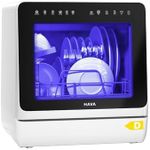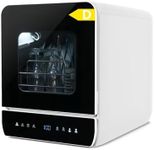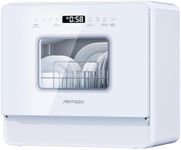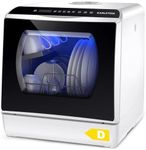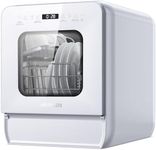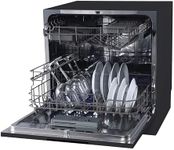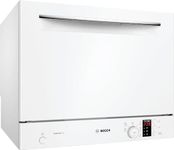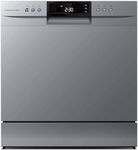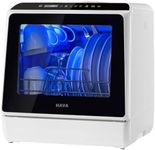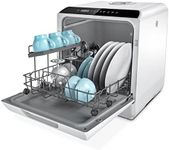Buying Guide for the Best Mini Dishwashers
Choosing the right mini-dishwasher can make a big difference in your kitchen efficiency and convenience. Mini-dishwashers are perfect for small spaces, such as apartments, dorms, or RVs, and they can save you time and effort in cleaning dishes. When selecting a mini-dishwasher, it's important to consider several key specifications to ensure you get the best fit for your needs. Here are the main specs to look at and how to navigate them.Size and CapacitySize and capacity refer to the physical dimensions of the dishwasher and how many dishes it can hold. This is important because you need to ensure the dishwasher fits in your available space and meets your dishwashing needs. Mini-dishwashers typically range from 18 to 24 inches in width. Smaller models are ideal for very tight spaces but may hold fewer dishes, while slightly larger models can accommodate more items. Consider your kitchen space and the number of dishes you typically need to wash to choose the right size and capacity.
Energy EfficiencyEnergy efficiency indicates how much power the dishwasher uses to operate. This is important for reducing your energy bills and minimizing environmental impact. Look for dishwashers with an Energy Star rating, which means they meet specific energy-saving standards. Higher efficiency models will use less water and electricity, making them more cost-effective in the long run. If you are environmentally conscious or want to save on utility costs, prioritize energy-efficient models.
Noise LevelNoise level measures how loud the dishwasher is during operation. This is important if you have a small living space or prefer a quiet environment. Noise levels are measured in decibels (dB), with lower numbers indicating quieter operation. Mini-dishwashers typically range from 45 to 60 dB. If you need a quieter appliance, look for models with lower dB ratings. Consider your tolerance for noise and the proximity of the dishwasher to living or sleeping areas when making your choice.
Wash Cycles and OptionsWash cycles and options refer to the different settings available for cleaning dishes. This is important for flexibility in handling various types of dishwashing needs. Common cycles include normal, heavy, quick, and eco-friendly washes. Some models also offer specialized options like sanitizing or delicate cycles. If you have diverse dishwashing requirements, such as heavily soiled pots or delicate glassware, look for a dishwasher with multiple cycles and options. Think about the types of dishes you wash most frequently and choose a model that offers suitable cycles.
Installation TypeInstallation type indicates how the dishwasher is set up in your kitchen. This is important for ensuring compatibility with your space and plumbing. Mini-dishwashers can be either countertop or built-in. Countertop models are portable and can be placed on any flat surface, making them ideal for renters or those with limited space. Built-in models are installed under the counter and require more permanent setup. Consider your kitchen layout and whether you need a portable or fixed appliance to decide on the installation type.
Water ConsumptionWater consumption measures how much water the dishwasher uses per cycle. This is important for managing water usage and costs. Mini-dishwashers typically use between 2 to 4 gallons of water per cycle. Lower water consumption models are more efficient and environmentally friendly. If you are concerned about water usage or live in an area with water restrictions, look for models with lower water consumption. Assess your water usage habits and choose a dishwasher that aligns with your conservation goals.
